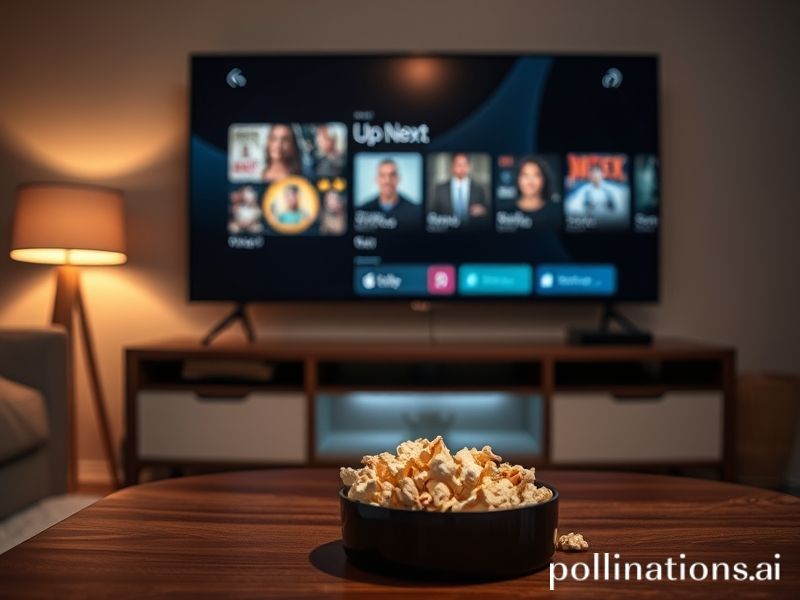Apple TV: The Black-Puck Diplomat Quietly Colonizing Earth’s Couches
Apple TV: The Tiny Black Box That Conquered the World’s Living Rooms—Or at Least Tried To
By the time you finish reading this sentence, Apple will have sold another three Apple TV units somewhere between Reykjavík and Riyadh. That’s the official corporate line, anyway; the real figure is probably closer to one unit and two people Googling “is Apple TV worth it” before guilt-buying another Fire Stick. Still, the myth persists that the sleek obsidian puck is quietly colonizing the planet’s HDMI ports like an upscale digital kudzu.
From a distance, Apple TV’s global conquest looks suspiciously tidy. In Singapore, it nestles beside Singtel set-top boxes in climate-controlled condos, obediently serving up Ted Lasso like a butler who’s read too many motivational posters. In Lagos, it’s the status symbol du jour for the emerging tech elite, who stream Premier League matches while the generator hums outside like a disgruntled jazz band. Meanwhile in Paris, existentialists claim to use it “ironically,” which is French for “I paid full retail but refuse to admit I enjoy anything.”
Yet peel back the brushed-aluminum veneer and you’ll find the same geopolitical chess game every streaming device plays, only with a shinier bishop. Apple TV is the Switzerland of the content wars: ostensibly neutral, multilingual, and charging you rent for the privilege of neutrality. Want Netflix, Disney+, and your local broadcaster’s app? That’ll be three separate subscriptions, two regional licensing negotiations, and one existential crisis when you realize you’re paying more per month than some countries’ minimum wage.
The hardware itself is a marvel of minimalist hubris. A14 chip, Thread support, 4K HDR that makes glaciers look clinically depressed—specs impressive enough to distract from the fact that most users still can’t figure out why the remote keeps disappearing between couch cushions like a shy hamster. (Apple’s solution: sell a $59 lanyard. Capitalism, baby.) Internationally, the remote’s touchpad has become a litmus test for cultural patience. Germans reportedly hurl it at walls with uncharacteristic emotion; the Japanese politely bow to it before switching inputs back to Nintendo.
But the real story is the App Store, that digital Silk Road where a teenager in Jakarta can hawk a $2.99 meditation app to a stressed-out accountant in São Paulo. Apple skims 30% off the top, of course, because nothing says “Think Different” like a universal tariff. Meanwhile, local developers from Nairobi to Naples scramble to localize their apps, praying that Cupertino’s review board doesn’t mistake Swahili profanity for a feature request.
Then there’s the privacy theater. Apple assures us that what happens in Apple TV stays in Apple TV, encrypted tighter than a Swiss bank vault—unless, naturally, a government politely asks for metadata with the same tone one uses to request extra napkins. Last year, India reportedly wanted viewing data “for security purposes,” which is bureaucratic code for “we heard The Kashmir Files is trending.” Apple, ever the privacy evangelist until the bill comes due, is “reviewing the request.” Translation: negotiating a price.
And so we arrive at the broader significance: Apple TV is less a gadget than a diplomatic passport, granting entry to the gated community of global pop culture while charging roaming fees. It turns every living room into a minor consulate of American soft power, broadcasting Ted Lasso’s mustache and Beyoncé’s latest visual album with equal algorithmic reverence. Resistance is futile; switching inputs is just too much work.
In the end, Apple TV succeeds not because it’s indispensable, but because it’s frictionless. It slips into your life the way a clever pickpocket slips into your pocket: so smoothly you thank him for the privilege. And as the world lurches from one crisis to the next—pandemics, recessions, climate horrors—you can always dim the lights, cue up Severance, and pretend the biggest problem is remembering where you left the remote. That, dear reader, might be Apple’s most profitable illusion yet.







